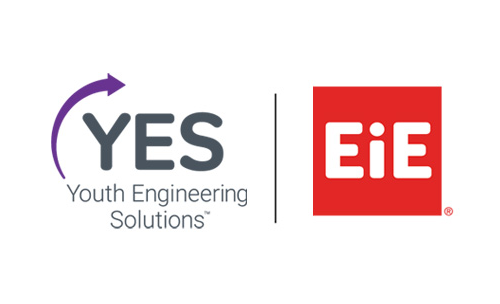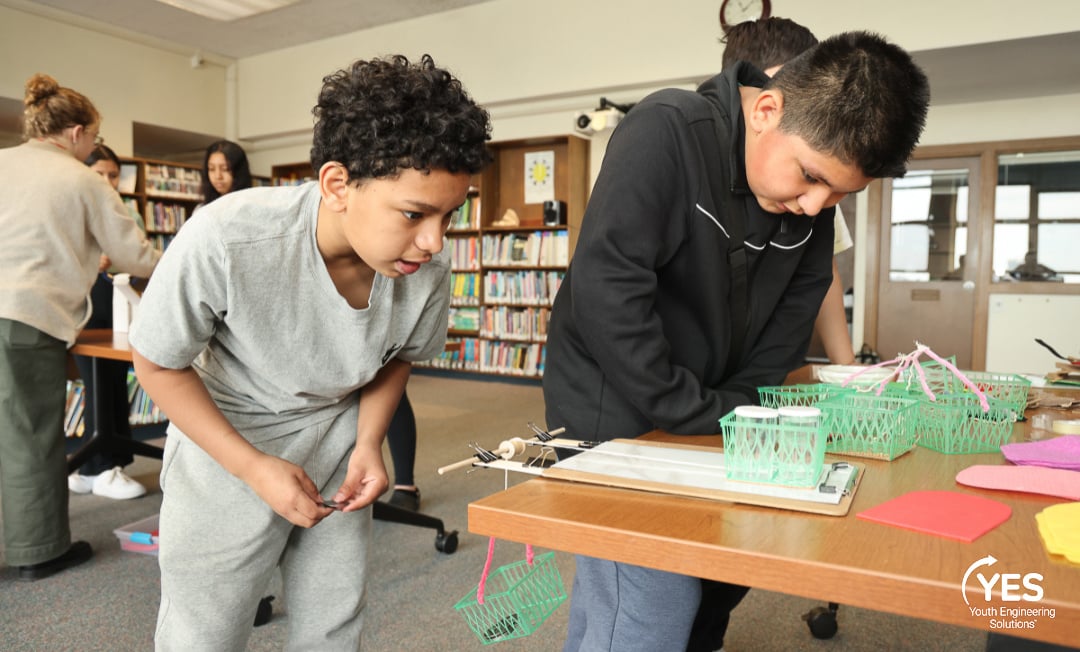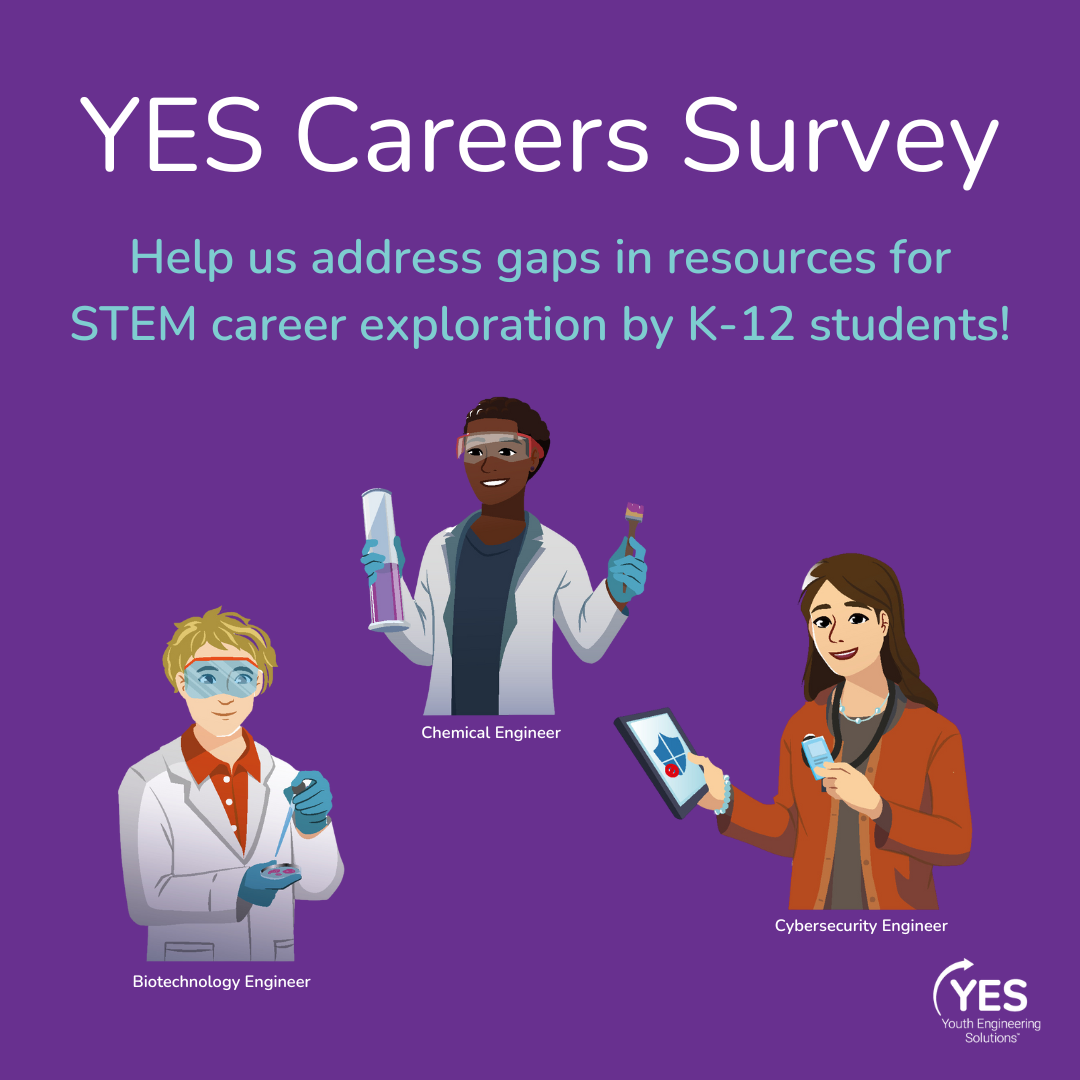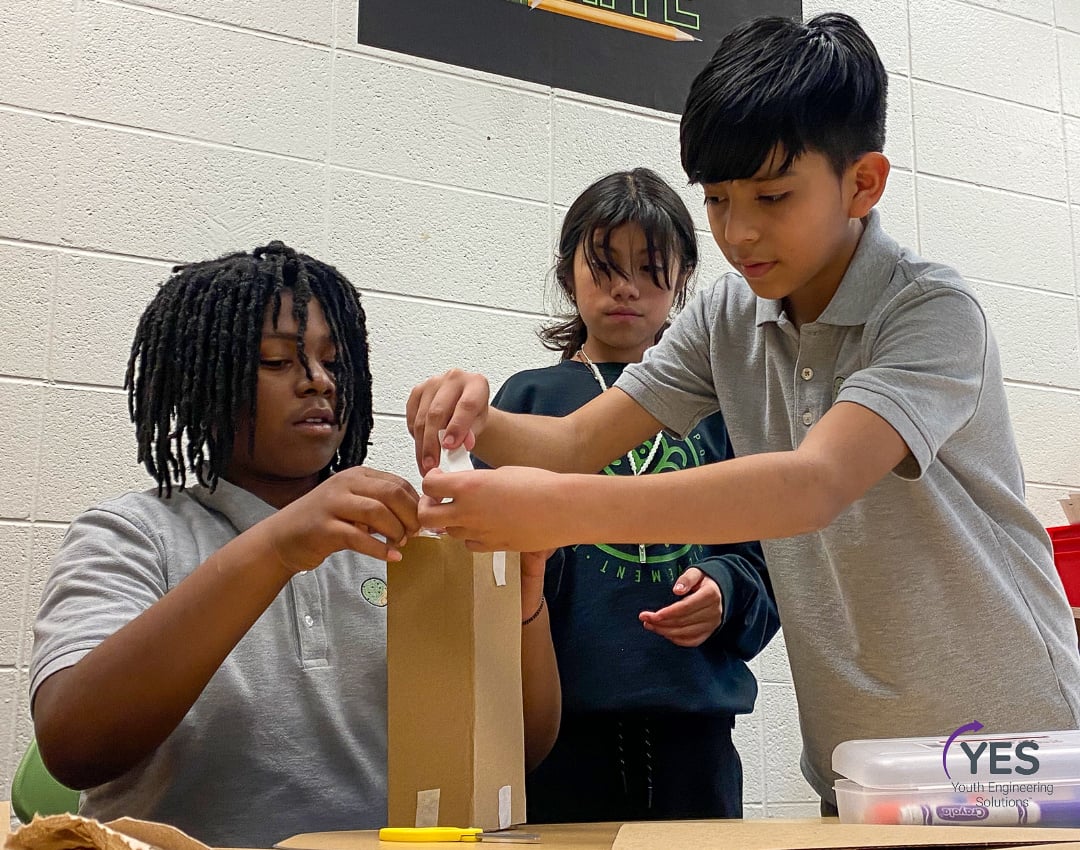Reposted with permission from our friends at Overdeck Family Foundation, whose generous and ongoing support has enabled us to create and expand our free, hands-on STEM activities for families. Read on to find out how they’ve extended their grant program with EiE and other partners to serve even more young learners.
The pandemic school year brought STEM (science, technology, engineering, and math) learning into the home, asking parents to take on more active instructional roles than ever before. Edtech tools, museums, libraries, and parent networks stepped in to offer guidance, but the brunt of the impact fell on families. Even as collaboration between families, teachers, and students became more important and prevalent inside the “classroom,” support for STEM learning opportunities, especially hands-on experiences, was limited.
The difficulty with these subjects as compared to reading is clear: A 2020 survey of parents showed that the subject they struggle most to support is math, and the time they spend engaging in STEM-related topics with their children is significantly lower than the time spent on literacy.Fostering STEM skills, particularly math, presented room for improvement by our education system even pre-pandemic. Research shows that there is a statistically significant association between parent involvement and a child’s academic performance, over and above the impact of the child’s intelligence. If parents are not equipped to facilitate STEM skill development, their children miss opportunities to build positive identity and strong engagement in STEM learning. When parents have high math anxiety, for example, their children learn significantly less math over the school year and have more math anxiety themselves by the school year’s end. This means that even parents with the best intentions can unwittingly have a negative effect on the academic outcomes of their children.
Additionally, research shows that parents’ attitudes about their young children’s math learning are more strongly related to their own math attitudes than to their children’s actual math achievement, further underscoring the importance of programs that collaborate with parents to build joy, enthusiasm, and relevance into their math engagement. We know that when parents are supported and highly involved in their children’s educational journey, children earn higher grades and score higher on assessments, increase school attendance, complete homework and graduate high school at a higher rate, and are more likely to enroll in higher education. That means that initiatives that aim to shift parent mindsets around math can be pivotal in influencing a child’s development.The Opportunity in Family STEM
It’s clear that engaging families in STEM learning is crucial for children’s success, even more now that roles have shifted. The question is how to do it most effectively to build positive experiences for kids and caregivers alike.A recent op-ed by Karen Pittman from the Forum for Youth Investment and Linda Darling-Hammond from the Learning Policy Institute outlined the ways parents are looking beyond fall reopenings to rethink schooling. Specifically, parents desire choices for interest-driven learning opportunities beyond the classroom. Survey data they cite, collected by Learning Heroes, show that parents want their children to develop a broad set of skills and believe that home, school, and extracurriculars play complementary roles in achieving this.
High-quality STEM programs may differ in context, delivery method, dosage, and outcomes, but are consistently characterized as:
● Framed around strengths, not deficits
● Aligned with families’ needs and culturally affirming
● Multimodal and comprehensive, providing multiple entry points to structured activities with follow-up resources that extend the learning
● Focused on helping families find opportunities for STEM learning anywhere, anytime
● Engaging for both students and families
● Designed to foster a strong home-school connection
Specifically, these programs look at families as key participants versus add-ons, and focus on connecting STEM learning to daily life. They believe families are the key to unlocking improved STEM mindsets, identities, and skills.
During the pandemic, parents have expressed many barriers to engaging effectively with their children’s learning at home: lack of time and energy, balancing multiple children’s needs, struggles with confidence, language barriers, lack of communication with educators, etc. For a program to succeed in improving outcomes, it not only needs to take a comprehensive view of parent support, but ensure that its offering is evidence-based and responsive to family needs. We believe the programs we fund under our family STEM strategy do just that.
Why We Fund Family STEM
Recently, we made three family STEM grants to support millions of families, especially those farthest from opportunity. All three programs—EiE Family Engineering, PBS SoCal Family Math, Abriendo Puertas + MathTalk—show strong signals of demand and promising evidence of promoting positive STEM outcomes. They have also thoughtfully structured their offerings to facilitate access for diverse families at a time when the demands for caregivers are more intensive than ever.
Insights and challenges from investing in Family STEM
● Family STEM activities can be presented in an easy-to-access, technologically simple way and completed at home without extensive educator guidance or oversight. Family engineering activities from EiE, which focus on engineering topics that are often difficult to understand, resulted in 92% of families reporting that they “understand the steps that engineers use to solve problems.”
● Various modalities (at-home resources, online activities, events, workshops) are effective at improving parent STEM attitudes. While low-tech resources are more universally accessible, 15% of families surveyed by EiE specifically requested additional resources that require digital design, such as animated characters and interactives, clickable exploration, and video content. Programs that provide a range of options that are responsive to families’ interests, assets, and preferences are critical to success.
● The same aspects that make these programs engaging for families also make impact assessment challenging. Families become engaged through multiple “pathways” that personalize their experience, whether that’s from word-of-mouth, social media, or a PBS Kids show. They then proceed to engage with the program more fully, either in a physical or digital setting. While this personalization is appealing for families, it does make it difficult for our grantees to understand their impact. To combat that, our grantees are refining their data infrastructure to collect more reliable information about fidelity, dosage, and frequency of usage.
Our 2021 Family STEM Grants
In 2021, we made grants totaling $3.75 million to organizations that support family STEM. Below, we highlight three such organizations that are leading the way in engaging families in STEM learning. We believe this work is especially crucial after more than a year of pandemic learning, which has disproportionately affected low-income students and students of color, with math being particularly impacted.
EiE Family Engineering
EiE is the award-winning curricula division of the Museum of Science, Boston, with research-based, classroom-tested programs that empower children to become lifelong STEM learners and passionate problem solvers. The EiE product line bridges PreK-8 school, after school, STEM events, and the family home learning setting. Educators express consistently positive feedback about the ease, relevance, and quality of the curriculum and resources. With our Foundation’s support from 2018-2021, EiE created family STEM engagement tools to bundle with their packages of curricula. Pilot data show the resources enable child and family understanding of engineering as a discipline, and positively impact child and family perceptions of themselves as engineers.Historically, at-home engineering and computer science products are not accessible to all families, do not fully involve both adults and children, and do not accurately represent the nature and importance of engineering and computer science. EiE shifts that by setting problems in a fun, realistic context, guiding families through the design process, allowing open-ended solutions, and not assuming prior knowledge of engineering. EiE has found that when families are given the opportunity to engage in high quality engineering activities, their perceptions of engineering, its value to the world, and their relationship to it change, and they are more likely to foster a positive STEM identity in their child.
Our 2021 grant of $1.5M over three years will support EiE’s scale and research plans to enable greater access to their family resources and increased understanding of the impact of resource usage on youth STEM engagement across formal and informal learning settings. It also includes funds for a Strategic Data Project Fellow to research the influence of at-home STEM learning and inform the evolution of a digitally focused product roadmap, expansion of Computer Science (CS) units and math extensions, and a family-facing microsite. With the foundation’s grant, over 500,000 children ages 4-11 will experience free, hands-on, research-based activities designed to build their confidence, collaborative problem-solving skills, and understanding of engineering and CS.
PBS SoCal Family Math
PBS SoCal's Family Math program delivers trusted tools and bilingual resources that help families with children ages 2-5 uncover the joy of math in everyday experiences. The program views parents as curiosity guides, and provides free access to an array of bilingual, multimedia tools and resources to support parents in introducing early math concepts through fun activities with their children. It focuses on tangible ways for parents to translate concepts to home lessons by offering resources, tools, and activities that work in the context of daily life. As a media organization with multiple platforms for distribution, PBS SoCal brings the capacity and resources to expand Family Math messaging, ensuring that the content is culturally responsive, dynamic, and engaging, and connecting it to the highly recognized and trusted PBS brand.By using multiple media platforms to provide parents resources and tools to bring family math to life, we believe that parents will feel empowered to use these tools and engage their children with math activities at home. After a two-year pilot, we recently awarded a renewal grant of $1.95M over three years for PBS to scale their Family Math work in hopes of increasing parent knowledge of early math concepts, modeling positive math attitudes, and providing high-quality early math learning engagement through multiple in-person and digital channels.
Abriendo Puertas + MathTalk
Abriendo Puertas/Opening Doors honors and supports parents as their child’s first and most influential teacher. They facilitate local programs to strengthen family leadership, knowledge, and support systems—all key in preparing young children for school success. A $50,000 grant will help Abriendo Puertas introduce 5,000 low-income, primarily Latino families to an augmented reality learning app offered by MathTalk called Measure! Everything! Abriendo Puertas facilitators will disseminate the app and onboard new users, incorporating a pop-up activity and survey, and learning about the success, challenges, and impacts related to introducing a math app.
Abriendo Puertas/Opening Doors surfaced as an ideal dissemination partner for the Measure! Everything! app based on their experience introducing new tools to families and providing technological and content-specific support. Through this grant, we hope to learn what methods are most effective in supporting families as they use app-based math programming, what family and student outcomes result from its use, and how it leads to increased access for families furthest from opportunity.
Lessons Looking Forward
Earlier this year, along with the Heising-Simons Foundation, we funded a new home for family math at the National Association for Family, School and Community Engagement (NAFSCE). Their newly established National Center on Family Math will create a platform to distribute family math content. Using lessons learned from their national outreach strategies and thought leadership in family engagement, NAFSCE hopes to advance connections between early math research and family practice.
In partnership with the Family Math roadmap collaborative, researchers, practitioners, and parent advisors have created a shared research agenda with eight priority areas relevant to these grants, including community-based partnerships, home/school connections, and families as co-designers.
In addition to the above, we’re hoping to better understand the following as it relates to our family STEM grantmaking:
● How can organizations effectively shift parent attitudes around STEM and increase overall engagement?
● What mode of programming (in-person, virtual, hybrid) is most effective at shifting parent STEM mindsets at scale?
● Is it easier (cheaper, faster, more universally effective) to shift parent mindsets around STEM through engineering and computer science activities than through math?
As we continue to expand access and quality of family STEM options, we are grateful to our grantee partners for centering family collaboration as a way to transform and strengthen children’s STEM learning. As we continue to build knowledge about measurement, partnerships, math attitudes, and the home/school connection, we commit to sharing our insights with the field. We invite you to consider how incorporating family engagement into your STEM program or STEM funding may benefit children and their families.
You’ll find more news and resources about the Foundation here.








